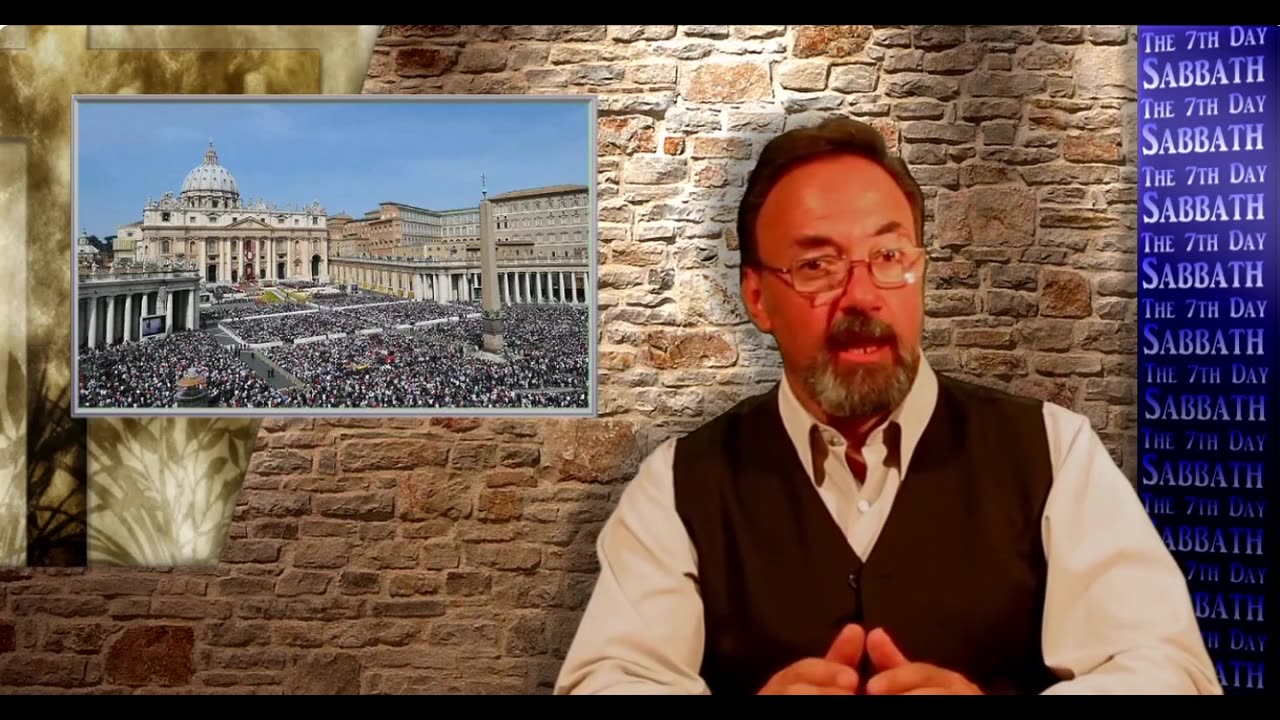Premium Only Content

THE SABBATH IS THE LORD'S DAY
THE CHANGE OF THE SABBATH IS MAN'S DAY
Roman Catholics acknowledge that the change of the Sabbath was made by their church, and declare that Protestants, by observing the Sunday, are recognizing her power. In the “Catholic Catechism of Christian Religion,” in answer to a question as to the day to be observed in obedience to the fourth commandment, this statement is made: “During the old law, Saturday was the day sanctified; but the church, instructed by Jesus Christ, and directed by the Spirit of God, has substituted Sunday for Saturday; so now we sanctify the first, not the seventh day. Sunday means, and now is, the day of the Lord.” GC88 448.1
As the sign of the authority of the Catholic Church, papist writers cite, “the very act of changing the Sabbath into Sunday, which Protestants allow of ... because by keeping Sunday strictly they acknowledge the church's power to ordain feasts, and to command them under sin.” [“Abridgment of Christian Doctrine.”] What then is the change of the Sabbath, but the sign or mark of the authority of the Romish Church—“the mark of the beast”? GC88 448.2
The Roman Church has not relinquished her claim to supremacy; and when the world and the Protestant churches accept a sabbath of her creating, while they reject the Bible Sabbath, they virtually admit this assumption. They may claim the authority of tradition and of the Fathers for the change; but in so doing they ignore the very principle which separates them from Rome,—that “the Bible, and the Bible only, is the religion of Protestants.” The papist can see that they are deceiving themselves, willingly closing their eyes to the facts in the case. As the movement for Sunday enforcement gains favor, he rejoices, feeling assured that it will eventually bring the whole Protestant world under the banner of Rome. GC88 448.3
Romanists declare that “the observance of Sunday by the Protestants is an homage they pay, in spite of themselves, to the authority of the [Catholic] Church.” [“Plain talk about Protestantism,” p. 213.] The enforcement
of Sunday-keeping on the part of Protestant churches is an enforcement of the worship of the papacy—of the beast. Those who, understanding the claims of the fourth commandment, choose to observe the false instead of the true Sabbath; are thereby paying homage to that power by which alone it is commanded. But in the very act of enforcing a religious duty by secular power, the churches would themselves form an image to the beast; hence the enforcement of Sunday-keeping in the United States would be an enforcement of the worship of the beast and his image. GC88 448.4
But Christians of past generations observed the Sunday, supposing that in so doing they were keeping the Bible Sabbath, and there are now true Christians in every church, not excepting the Roman Catholic communion, who honestly believe that Sunday is the Sabbath of divine appointment. God accepts their sincerity of purpose and their integrity before him. But when Sunday observance shall be enforced by law, and the world shall be enlightened concerning the obligation of the true Sabbath, then whoever shall transgress the command of God, to obey a precept which has no higher authority than that of Rome, will thereby honor popery above God. He is paying homage to Rome, and to the power which enforces the institution ordained by Rome. He is worshiping the beast and his image. As men then reject the institution which God has declared to be the sign of his authority, and honor in its stead that which Rome has chosen as the token of her supremacy, they will thereby accept the sign of allegiance to Rome—“the mark of the beast.” And it is not until the issue is thus plainly set before the people, and they are brought to choose between the commandments of God and the commandments of men, that those who continue in transgression will receive “the mark of the beast.”
-
 1:32:46
1:32:46
Glenn Greenwald
8 hours agoHillary Blames TikTok for Anti-Israel Sentiment; MAGA Sycophants Gain Pentagon Press Access; Who Should Win Anti-Semite of the Year? See the Top 10 Finalists | SYSTEM UPDATE #552
128K97 -
 56:12
56:12
Flyover Conservatives
1 day ago100% Chance the Grid Fails: Why No One Is Fixing It (and How Easy It Is) - Tommy Waller | FOC Show
31.5K10 -
 LIVE
LIVE
JDubGameN
6 hours agoStarlink Network Test Stream! | Road to 100 Followers
959 watching -
 2:17:31
2:17:31
The Daily Signal
9 hours ago $8.32 earned🚨BREAKING: Tennessee Congressional Election Results, Minneapolis Police to "Intervene" Against ICE,
38.2K6 -
 1:52:47
1:52:47
megimu32
5 hours agoON THE SUBJECT: Christmas Vacation Is UNTOUCHABLE!
24K4 -
 59:56
59:56
Sarah Westall
7 hours agoNeurostrike, Cognitive Targeting & the New Tech Arms Race w/ Professor Armin Krishnan
18.9K4 -
 2:52:28
2:52:28
Nikko Ortiz
8 hours agoNo More Gear Fear... | Rumble LIVE
26.7K1 -
 5:00:51
5:00:51
Razeo
6 hours agoTopside carnage with some fries.,
14.7K -
 1:03:17
1:03:17
BonginoReport
9 hours agoViolent Criminals Run Free in NY & CA - Nightly Scroll w/ Hayley Caronia (Ep.188) - 12/02/2025
130K54 -
 6:33:02
6:33:02
The Rabble Wrangler
22 hours agoBattlefield with The Best in the West
12.6K